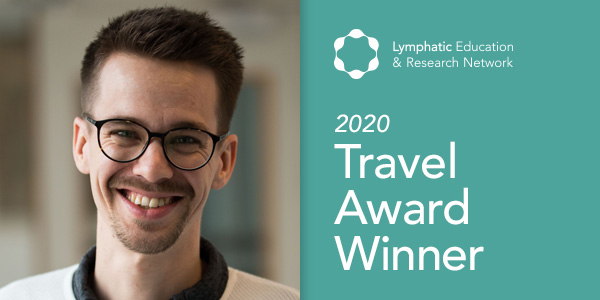Simon Stritt, currently a postdoctoral fellow at Uppsala University (Sweden), under the supervision of Prof. Taija Mäkinen received a Travel Award from LE&RN to attend the GRC Conference on Lymphatics in early March 2020 in Ventura, CA. We asked Simon to share his thoughts on that experience with us and to tell us a bit about his research and future plans.
1. What did you get out of the Lymphatic Conference? Why did you feel it was important to attend?
The Gordon Research Seminar and especially Conference on Lymphatics are among the most renown and prestigious meetings in the field. My participation allowed me to interact and connect with some of the brightest researchers in the field, exchange scientific ideas, receive important feedback on my own work, as well as listen to and enjoy cutting edge science in the field prior to publication. The networking perspective that these rather private meetings allow for are of particular importance to me as a post-doc.
2. What are your areas of interest in research?
I am currently studying the role of the endothelial cytoskeleton and associated proteins in determining the specialized functions of different vessel types. A further aspect of my postdoctoral studies governs the spatial, molecular, and functional characterization of organ-specific lymphatic endothelial progenitor cells.
3. What are your hopes and plans for your career and your research?
I have always been fascinated by the thought that my research could positively influence the life of humans. Therefore, I strive to understand the molecular causes of cardiovascular disorders with the ultimate goal of identifying possible therapeutic targets. I hope that I will soon be able to pursue this aim as a group leader.
4. Why do you believe that, in general, lymphatic research is important? What might the field accomplish within the next few years?
The lymphatic vasculature is critically implicated in normal homeostasis but also in the pathogenesis of a multitude of disorders, yet pharmaceutical options intervening with its functional properties are scarce.
Recent advances in the origins of lymphatic endothelial progenitor cells in different vascular beds together with the utilization of RNA single-cell sequencing as well as single-cell proteomics will continue to improve our understanding of these cells. Ultimately, this might allow the identification of potential therapeutic targets to directly and specifically interfere with lymphatic vessel function or growth.
LE&RN programs, like LE&RN Travel Awards, are only possible because of our Partners and Supporting Members. Become a Supporting Member today.

